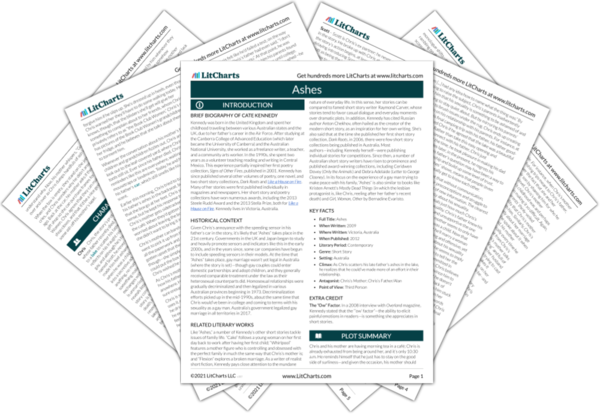The car that Chris and his mother drive out to the lake symbolizes Chris’s late father, Alan. The car—which belonged to Chris’s father—brings back difficult, painful memories for Chris, due to the fact that it smells so much like his father used to. Furthermore, the car’s cruise-control sensor, which beeps loudly anytime Chris exceeds the speed limit, makes the connection between the car and his father far more difficult for Chris to bear. Each time the sensor goes off on their drive to the lake, it startles Chris—and, strangely, it makes him feel guilty. In this way, driving his father’s car makes Chris feel like his overbearing father is still nudging him and trying to control his behavior, even from beyond the grave. Sometimes, Chris only jumps at the noise; other times, it makes him angry as it reminds him of all the ways that his father failed him in life.
Interestingly, the car and its sensor only seem to bother Chris on the drive to the lake to scatter his father’s ashes. As he and his mother get back in the car to head home, Chris makes no mention of not looking forward to smelling his father’s characteristic scent. He also doesn’t acknowledge the possibility that in order to make it back to the gift shop his mother wants to visit before it closes, he might have to speed—thereby triggering the sensor. With this, the story suggests that the ritual of scattering his father’s ashes has made his father’s memory (and the accompanying grief and mixed emotions about the past) easier for Chris to face. Following the ritual, Chris is able to focus on his mother and on improving their relationship rather than on his father’s mistakes. By the story’s end, then, the car seems to have become just a car in Chris’s mind—just as Chris’s father will gradually become a memory that will perhaps become easier to live with over time.
Alan’s Car Quotes in Ashes
Since his father died, Chris keeps coming across small reminders everywhere, set like mousetraps ready to snap, like little buried landmines. Today, for instance, they’re in his father’s car, which his mother says she can’t bear to sell. It smells so characteristically, still, of shoe polish and peppermints, and in the back seat lies the woollen tartan scarf his father had worn for years. Each detail had assailed Chris as he’d opened the door, reaching over to stow the box in its calico bag on the back seat.
“Here, here,” his mother had remonstrated. “At my feet.”
Where else? he’d thought sourly, finding the right key for the ignition, as the lifetime habit of keeping his responses to himself closed his mouth in a firm and well-worn line. A line that suggested nothing, broached nothing, gave nothing away.
His father’s car has some kind of cruse-control check that beeps at him every time he inadvertently goes above the set limit, and he keeps jumping when he hears it, feeling a ludicrous amount of guilt.












